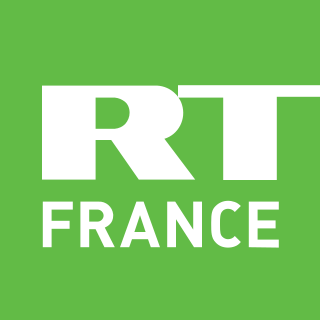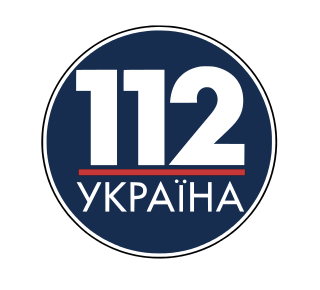RIA Novosti, sometimes referred to as RIAN (РИАН) or RIA (РИА), is a Russian state-owned domestic news agency. On 9 December 2013, by a decree of Vladimir Putin, it was liquidated and its assets and workforce were transferred to the newly created Rossiya Segodnya agency. On 8 April 2014, RIA Novosti was registered as part of the new agency.

RT, formerly Russia Today, is a Russian state-controlled international news television network funded by the Russian government. It operates pay television and free-to-air channels directed to audiences outside of Russia, as well as providing Internet content in Russian, English, Spanish, French, German, Arabic, Portuguese and Serbian.

NTV Plus is the brand name for the Russian digital satellite television service from NTV, transmitted from Eutelsat's W4 satellite at 36.0°E and from Bonum 1 at 56.0°E. Previously a part of Vladimir Gusinsky's media empire, now it is included in the Gazprom Media holding.
Television in Latvia was first tested in 1937 and introduced in 1954. Latvia was the first country in the Baltic States which started broadcasting.

The Russian Television and Radio Broadcasting Company or Russian Television and Radio Broadcasting Company, also known as Russia Television and Radio, is a national state-owned broadcaster which operates many television and radio channels in 53 of Russia's languages. The company was founded in 1990 and is based in Moscow.
Russia-1 is a state-owned Russian television channel, first aired on 14 February 1956 as Programme Two in the Soviet Union. It was relaunched as RTR on 13 May 1991, and is known today as Russia-1. It is the flagship channel of the All-Russia State Television and Radio Company (VGTRK).
Russia-24 is a state-owned Russian-language news channel from Russia. It covers major national and international events as well as focuses on domestic issues. It is owned by VGTRK.
Television in Moldova was introduced in 1958.
Russia-K is a Russian nationwide not-for-profit television channel that broadcasts shows regarding arts and culture. It belongs to the state-controlled VGTRK group.

RT Documentary is a Russian free-to-air documentary channel presented in both the English and Russian languages. It was launched on 23 June 2011 by the erstwhile President Dmitry Medvedev who visited RT's studio in Moscow, and deals with a wide variety of topics including Russian culture and life in Russia. The channel shows documentaries mostly on Russia but also from around the globe.

Dmitry Konstantinovich Kiselyov is a Russian TV presenter and propagandist. In 2013, Kiselyov was appointed by Russian President Vladimir Putin to head Rossiya Segodnya, a Russian state-controlled media group. He also serves as deputy director of the All-Russia State Television and Radio Broadcasting Company.

Spas is a federal channel in Russia which is associated with the Russian Orthodox Church. It started broadcasting in on July 28, 2005. The main owner of the channel is the Moscow Patriarchate of the Russian Orthodox Church. The founders of the TV channel are Alexander Batanov and Ivan Demidov.

RT en Français, also known as RT France between December 2017 to April 2023, is the French version of the Russian state-controlled news channel RT, funded by the Russian government. Before the production activities relocated to Moscow in April 2023, The channel was based in the Paris suburb of Boulogne-Billancourt.

112 Ukraine was a private Ukrainian TV channel which provided 24-hour news coverage. 112 Ukraine was available on satellites AMOS 2/3, via the DVB-T2 network, and was also available in packages of all major Ukrainian cable operators until it was banned from broadcasting in Ukraine in February 2021. The channel was focused on live broadcasting.

Mir, known formally as the International Television and Radio Company "Mir" is a multinational public television broadcaster, broadcasting programs in Russian and featuring programming from all the countries of the Commonwealth of Independent States.

Sergey Borisovich Brilyov or Brilev is a Russian television journalist on the state-owned TV channel Rossiya.

United News, Telemarathon or UA together is a joint information telethon which was launched on February 24, 2022, at the start of Russia's 2022 invasion of Ukraine. It began broadcasting at the start of the invasion on February 24, 2022, as #UAtogether and broadcast on Rada TV, the official television channel of the Verkhovna Rada.

On 24 February 2022, the Lithuanian authorities declared a state of emergency in the country due to the Russian invasion of Ukraine. Lithuanian President Gitanas Nauseda said that he condemned the aggression of the Russian Federation against Ukraine, and also said that after Russia started a war against Ukraine, NATO should clearly state that Russia is a serious threat to Euro-Atlantic security.

Oleg Borisovich Dobrodeev is a Russian journalist and media manager, general director of the All-Russian State Television and Radio Broadcasting Company (VGTRK).
Smotrim is a Russian state multimedia online platform developed by the largest state media holding All-Russia State Television and Radio Broadcasting Company (VGRTK). It began operating on November 1, 2020. The platform combines the content of all the holding's assets: federal channels Russia-1, Russia-24, Russia-K and the international channel RTR-Planeta, regional broadcasting of 79 branches throughout the country, radio stations Radio Rossii, Radio Mayak, Vesti FM, Kultura and Radio Yunost. The platform features news and reports, political talk shows, TV series, movies, podcasts, cartoons, humor, concerts, performances, documentaries, educational programs, entertainment shows, as well as live broadcasts of more than 20 Russian channels and radio stations. The platform has also an archive of programs produced by VGTRK for the Carousel TV channel in 2010–2023, and archive of programs from the Bibigon and Russia-2 TV channels, which were closed in 2010 and 2015, respectively.












